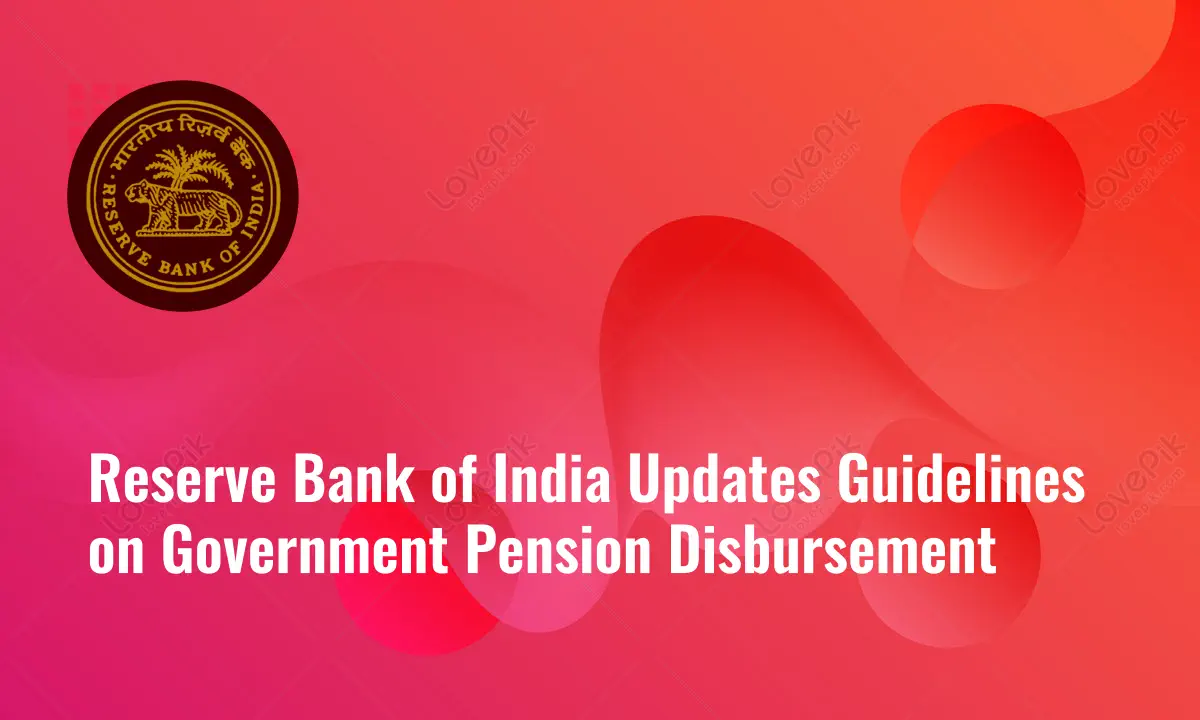RBI Issues Updated Master Circular on Pension Disbursement: Key Changes You Should Know

A Comprehensive Overhaul to Streamline Pension Payments Across India
In an important move that will affect millions of pensioners across the country, the Reserve Bank of India (RBI) has released an updated Master Circular on the Disbursement of Government Pension by Agency Banks for the financial year 2025–26. This directive—RBI/2025-26/05, dated April 1, 2025—not only consolidates past guidelines but also introduces several critical improvements to ensure faster, more transparent, and dignified pension delivery.
Applicable to all agency banks authorized to disburse pensions on behalf of Central and State Governments, the circular aims to remove bottlenecks, reduce grievances, and promote a more accountable and senior-friendly banking environment.
Also read: Payment of Pension to Government Pensioners – FAQs released by RBI
Why This Circular Matters
With over 70 lakh government pensioners relying on timely pension payments every month, inefficiencies or delays in the system can significantly impact their livelihood. By unifying previous instructions and introducing operational clarity, this Master Circular provides a single point of reference for all banks and enhances the service quality expected by pensioners, especially the elderly and differently-abled.
Key Features and Enhancements in the Master Circular
1. Pension Disbursement Based on Government Orders—No More Delays
Earlier, agency banks had to wait for RBI to forward government notifications like Dearness Relief (DR) orders before making payments. This caused unnecessary delays. The new circular simplifies the process:
- Banks can now directly act on DR and other benefit orders received from government sources via email, fax, post, or official websites.
- This ensures pensioners receive revised benefits without undue wait, especially after budget announcements or Pay Commission revisions.
👉 Why it matters: Senior citizens, many of whom depend solely on pension, will now receive enhancements in a more timely and hassle-free manner.
2. Compensation for Delayed Payments—Banks to Pay Interest
If a pension is not credited on time, the bank must pay a fixed compensation of 8% per annum on the delayed amount. Key points include:
- The interest must be credited automatically, without requiring a complaint from the pensioner.
- Applies to all delayed payments since October 1, 2008.
- Credit must be given on the same day that the arrears are paid.
👉 Why it matters: This holds banks accountable and compensates pensioners for any financial distress caused due to delay.
3. Ease of Access for Sick and Disabled Pensioners
Recognizing the unique challenges faced by the elderly, particularly those who are bedridden or unable to sign, the RBI has made it easier for them to access their funds:
- Pensioners who cannot sign can use thumb or toe impressions, verified by two witnesses, one of whom must be a bank official.
- In cases where even this is not possible, banks can accept a mark in place of a signature.
- The pensioner can nominate someone to withdraw the funds on their behalf after due verification.
👉 Why it matters: This offers dignity and independence to some of the most vulnerable citizens.
4. Life Certificate Acknowledgements to Avoid Misplacement
Each year in November, pensioners must submit a Life Certificate to continue receiving payments. However, complaints about misplaced certificates have been common. The circular mandates:
- Duly signed acknowledgements for life certificates submitted in person.
- Option for digitally generated receipts for online submissions.
- Integration with Core Banking System (CBS) for real-time updates.
👉 Why it matters: Prevents unwarranted stoppage of pension due to misplaced paperwork.
5. No Need to Open New Account for Family Pension
When a pensioner passes away, the surviving spouse is entitled to family pension. The new directive simplifies the process:
- If a joint account exists, banks must not insist on opening a new account.
- The joint account must be in the survivor’s name and reflected in the Pension Payment Order (PPO).
👉 Why it matters: Makes the transition seamless and less bureaucratic for grieving families.
Operational Guidelines for Banks
Reimbursement and Settlement Made Easier
A Single Window System has been introduced for prompt processing of pension reimbursement claims. This removes the need for intermediary clearance by RBI or SBI, reducing delays in claim settlement.
Nodal Officers for Grievance Redressal
- Each region/zone of the bank must have 1-2 nodal officers to monitor and resolve pension-related complaints.
- Regular Pension Adalats (forums) must be held across locations.
- A dedicated toll-free line staffed by trained personnel must be established for quick redressal.
👉 Why it matters: Direct, regional-level support ensures faster resolution of pensioner grievances.
Audit and Customer Service Enhancements
The circular introduces a checklist-based audit mechanism to monitor pension-related services at branch levels. Auditors must ensure:
- Timely pension and arrear credits
- Conversion of accounts to joint holders when needed
- Nomination details and TDS deductions are in place
- Life certificates and other mandatory declarations are obtained
- Feedback is taken from pensioners during inspections
👉 Why it matters: Encourages a culture of transparency and responsibility among banks.
Circulars Consolidated
This Master Circular integrates over 20 key circulars issued between 2002 and 2021, including:
- The 2008 directive on compensation for delayed pension
- 2015 circular on life certificate acknowledgement
- 2017 system control norms for government banking
- 2018 instructions on improved customer service
👉 Download Full Circular: Click here to access from RBI Master Circular Portal
Final Takeaway
The Reserve Bank of India’s updated Master Circular on pension disbursement is a landmark step toward modernizing pension delivery. With provisions that center the dignity and rights of pensioners, it sets a new standard for banking institutions to deliver public services with efficiency, accountability, and compassion.
View RBI Circular:
 Loading…
Loading…




